|
Recorded live in December 1972 and released the following year, Space
Ritual is an excellent document of Hawkwind's classic lineup, underscoring
the group's status as space rock pioneers. As the quintessential "people's
band," Hawkwind carried '60s countercultural idealism into the '70s,
gigging constantly, playing wherever there was an audience, and even playing
for free on five consecutive days outside the 1970 Isle of Wight Festival.
The band's multimedia performances were the perfect accompaniment for
exploring inner space and imagining outer space. While not concerned with
rock's material trappings, Hawkwind were, ironically, among the hardest-working
groups in Britain, averaging one show every three days during the year
preceding these recordings. Given all that practice, it's not surprising
that the performances collected here are incredibly tight (although, reportedly,
a couple of tracks were edited). Incorporating most of Doremi Fasol Latido,
the show for the Space Ritual tour was conceived as a space rock opera,
its blend of sci-fi electronics, mesmerizing psy-fi grooves, and heavy,
earthbound jamming punctuated with spoken word interludes from astral
poet Bob Calvert. Although his intergalactic musings date the album, coming
across now as camp futurism, they still provide fitting atmospheric preambles
to Hawkwind's astounding, mind-warping sounds. Calvert's manic recital
of Michael Moorcock's "Sonic Attack," for instance, is an exercise
in tension that subsequently explodes on the stomping "Time We Left
This World Today"; with Nik Turner's otherworldly sax, Dave Brock's
guitar distortion, and the earth-moving rhythm section of Simon King and
Lemmy, this track offers a blueprint for the album's most potent material.
Another standout is "Orgone Accumulator," ten minutes of hypnotic
(Wilhelm) Reich & roll that could be the missing link between Booker
T. and Stereolab. A 1973 advertisement described Space Ritual as "88
minutes of brain damage"; that characterization still holds true.
(by Wilson Neate, AMG)
|
|
As cliched as that sounds, this might be all the Hawkwind you'll ever
need. A double CD culled from live performances at what arguably constituted
the band's absolute peak, presented in the bestest way possible - whatever
complaints I may voice about the album, there'll never be a technical
quibble about them. It was a bit hard to adjust to the almost total lack
of crowd noise at first, but on second thought, it's possible that they
didn't even edit the crowd noise, as the crowds were too busy gaping at
the band's light effects and pyrotechnics, or maybe just tripping out,
which is the best thing to do while listening to Hawkwind. (That's not
my personal opinion - that's simply an objective fact).
The tunes, apart from a couple improvisatory bits, are all taken from
the band's first three albums, and just so happen to include nearly all
the highlights - the most glaring omission, of course, being 'Silver Machine'.
Why 'Silver Machine' isn't on here is a mystery: wasn't it, like, the
centerpiece of the show or something? Ah well, whatever. Is 'Silver Machine'
really that better than 'Master Of The Universe' or 'Orgone Accumulator'?
It's just a bit more 'anthemic', that's all.
Besides the band, two other people make their mark on this album - one
purely "spiritually", the other one in real mode. The former
is Michael Moorcock the fantasy writer, the band's emotional guru; the
other is weirdo fantasy poet and the principal lyricist for the band,
Robert Calwert, who often steps up on stage during the interludes to read
a poetic or prosaic excerpt on the standard topics (written either by
himself or by Moorcock). Sometimes Calwert even takes lead vocals on some
of the actual songs, but that's hardly a plus... on the other hand, the
need to stay in key was not really that significant for Hawkwind. All
of these excerpts are so damn greasy and sleazy ('in the tenth second
of forever I thought of the sea and a white yacht drifting... in the ninth
second of forever I remembered a warm room where voices played...') that
it's hard to listen to them without blushing, but I actually prefer them
to, say, Graeme Edge, as they seem to be less cliched and they're excellently
offered, too. Mr Calwert was truly a nutty guy.
As for the songs themselves... as usual, all you gotta do is let go, or
else you'll end up complaining on how all these lengthy drones sound exactly
the same. No need to complain! Just rest amazed at how these talentless
potheads who couldn't have enough individual musical talent to end up
in Barry Manilow's backing band actually managed to reach the "astral"
sound better than any other British band, better than Floyd, even! And
they didn't do this within a tuneless mess, either. One groove after another,
all carefully riff-based - even if you don't trip out, you can just mercilessly
headbang to them, as they're all ideal vehicles for headbanging. And in
the live setting, everything really comes alive, including even stuff
like 'Brainstorm' which I didn't care much about in the studio version.
The acoustic stuff is mostly gone (even 'Down Through The Night' receives
a fully electric treatment), but this is a live album and that's that.
A quick Roger Wilco-style poetic runthrough now: we enter space with a
deep grumble of the engines on 'Earth Calling/Born To Go', approach the
dark scary whirlwinds of the Black Hole in 'Down Through The Night', get
pursued by the unseen android forces of evil on 'Lord Of Light' (absolute
highlight - you gotta hear that rumble), finally get lost in the endless
depths of the everwide cosmos ('Space Is Deep') and end up in total mass
confusion ('Electronic No. 1'). Thus ends the first CD, on a note of despair
and chaos...
...and the second CD finds us in a triumphant mode, as we have regained
hope in salvation through a fabulous technical device - which is 'The
Orgone Accumulator' that helps us, after a few moments of turmoil ('Upside
Down') to acquire the necessary energy to save the day and emerge as the
world's most potent force during the eleven minutes of 'Brainstorm'. As
we ride on, our faith in power and intellect restored, we are again gripped
by doubt: are we really as powerful as we seem to be ('Seven By Seven'?)
The confusion grows on, gradually turning into near-suicidal schizophrenia
('Sonic Attack', Calwert's most thrilling performance on the album - it
was soundbites like this that made people really lose their minds on Hawkwind
concerts), until the only possible way left is resignation and disclamation
of oneself ('Time We Left This World Today') - and, of course, humiliation
before the Eternal Being ('Master Of The Universe'). Exit Stage.
Does this all sound silly? It sure does, but remember, that's Hawkwind
for you. Add a little bit of cheap Moorcock fantasy, dirty tattoos, light
effects, and above all, the famous dancer Stacia who used to 'illustrate'
much of the music onstage, gradually, ahem, "shedding her veils",
and you got the ultimate guilty pleasure of your life. The real-life Spinal
Tap. "Kiss on steroids", if you wish - except that Kiss never
wrote a song as gripping as anything on here...
(George
Starostin, Rating: * * * * 1/2)
|
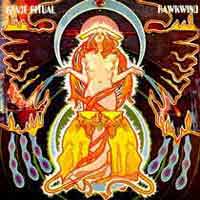
 Inselplatte
Inselplatte  #1 in Jahresliste
#1 in Jahresliste  Plattentipp
Plattentipp 
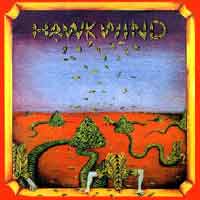
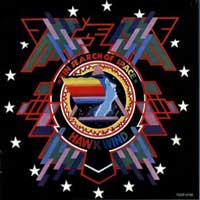
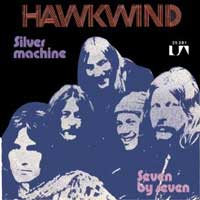
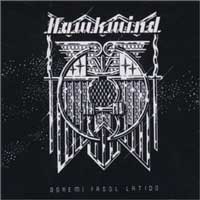
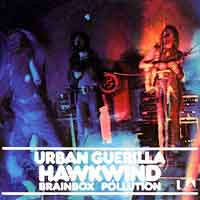
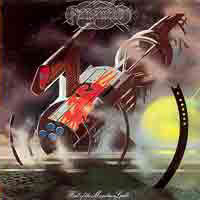
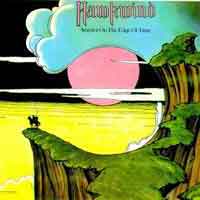
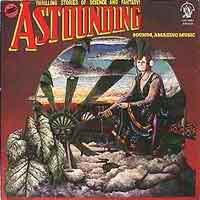
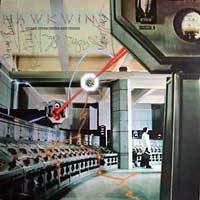
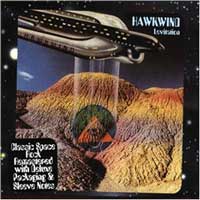
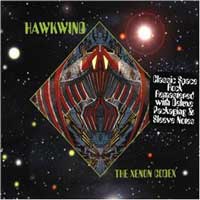
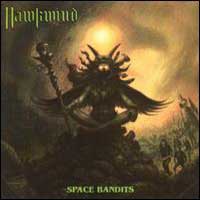
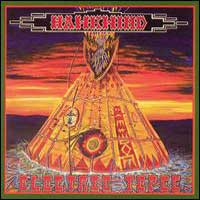
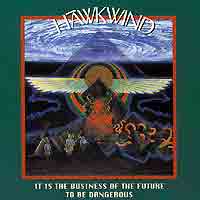
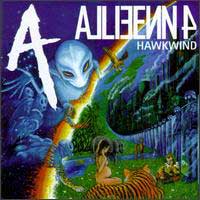
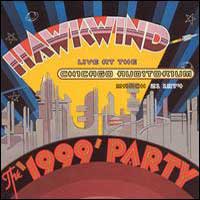
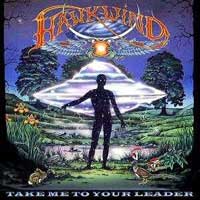
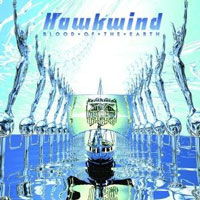


 eins von 1001 Alben, die Ihr hören solltet, bevor das Leben vorbei ist! (2008)
eins von 1001 Alben, die Ihr hören solltet, bevor das Leben vorbei ist! (2008)  Hawkwind
Hawkwind 